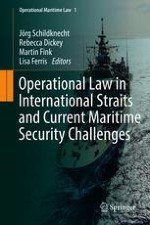2018 | OriginalPaper | Buchkapitel
The Right of Visit of Foreign-Flagged Vessels on the High Seas in Non-international Armed Conflict
verfasst von : Martin Fink
Erschienen in: Operational Law in International Straits and Current Maritime Security Challenges
Aktivieren Sie unsere intelligente Suche, um passende Fachinhalte oder Patente zu finden.
Wählen Sie Textabschnitte aus um mit Künstlicher Intelligenz passenden Patente zu finden. powered by
Markieren Sie Textabschnitte, um KI-gestützt weitere passende Inhalte zu finden. powered by
